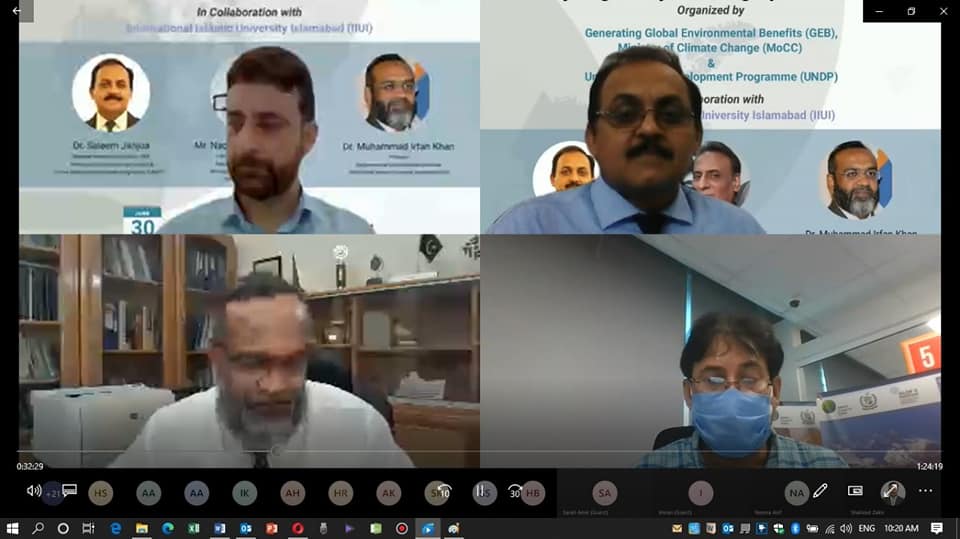Analyzing Utility of Infographics for EIMS

On 30th June 2020, a training programme titled “Analyzing Utility of Infographics for EIMS” was organized jointly by the Ministry of Climate Change (MoCC), Government of Pakistan along with the United Nations Development Programme (UNDP) under its GEB initiative in partnership with the International Islamic University Islamabad (IIUI).
The training started with the name of Allah and a formal round of introduction among participants. Dr. Saleem Janjua welcomed all participants and briefly explained the objectives, outcomes and progress of GEB Project to date. He addressed the important question that why is it imperative to establish an Environmental Information Management System (EIMS)? The need for an EIMS in Pakistan can be attributed to three main reasons. First, Pakistan has been listed among the countries which are most susceptible to adverse impacts of climate change. Especially, unprecedented growth in population, trans-boundary water issues, aggravated levels of air pollution (e.g. tropospheric ozone, particulate matter, trace gases) might be heading towards food security issues in Pakistan. Therefore, climate stressors (temperature, precipitation and extreme weather event) along with afore-mentioned parameters provide a rather dreary picture for the future of Pakistan, especially in terms of agriculture crop production, which is at the receiving end of these stressors. Also, environmental problems of Pakistan are a real challenge to deal with, as not a single environmental monitoring network is currently operational in Pakistan. Due to the higher costs of monitoring equipment, most of the Pakistani authorities either possess outmoded equipment or do not have one. To cope with the impacts of excessive emissions is extremely costly for developing and even developed countries as well. Various mitigation strategies to curb air pollution are not feasible especially in developing part of the world (like Pakistan) as their economies are mostly dependent on outdated agricultural & industrial practices. In such circumstances, there is dire need to go for only cost-effective methods and strategies to have efficient use of available resources. The 2nd issue is that there is no clear policy feedback mechanism at the level of regulatory authorities in Pakistan. NEQs have been enforced but there is no such feedback whether the environmental policies were implemented in true spirit or not through real data after monitoring of NEQs. The 3rd issue remains that different government departments in Pakistan (federal & provincial) produce data, but its availability and accessibility is a challenge. Data collection, storage, and its retrieval by the public sector, general public, as well as the research community are also ordeal tasks. To address the above mentioned issues - as well as many other similar issues - it is pertinently important to establish an EIMS in Pakistan at federal level (Ministry of Climate Change, Islamabad). Hence, this calls for an active role of relevant stakeholders
After the remarks of Country Coordinator, Ms. Numra Asif, Programme Assistant, GEB-UNDP briefly discussed EIMS, its basic features and global examples. She also addressed the question that What is the role of infographics for an Environmental Information Management System (EIMS)? The answer remains that the role is pertinently important. It is only with infographics that we can communicate information on environmental issues to various stakeholders in an effective manner and thus support informed decision-making. Poor visuals of environmental data lead to bad planning and hampers sustainability. Thus, the integration of quality infographics into an EIMS is the need of the time.
Dr. Irfan, Professor, IIUI gave a detailed presentation on the role of infographics for EIMS. He also explained types of infographics as well as their application. Overall, the training session was well received by the audience as it was informative and productive. PMU-GEB was also appreciated by key stakeholders for arranging capacity building activities despite COVID-19 Pandemic.